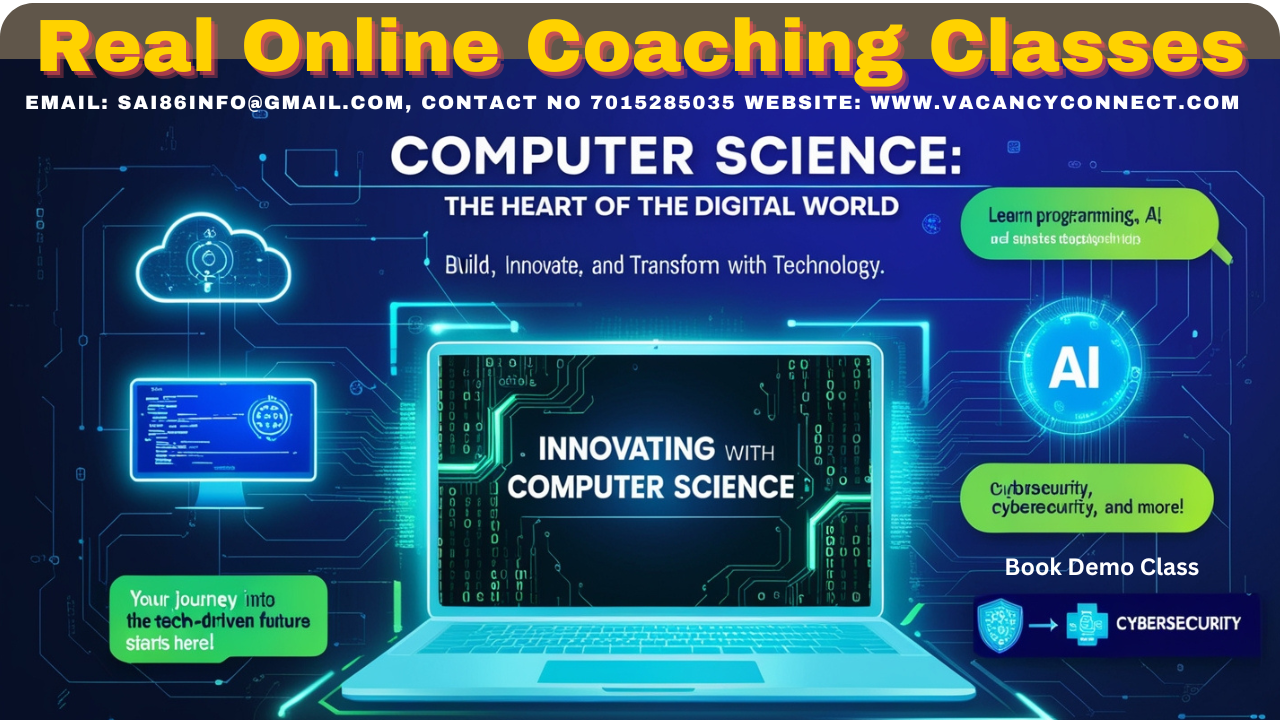Introduction to Computer Science
Computer Science is the study of computers, computational systems, and algorithms. It is the driving force behind technological advancements, transforming industries and reshaping the way we live, work, and communicate. Whether it’s artificial intelligence, cybersecurity, or software development, Computer Science as a subject equips individuals with the skills to innovate and solve real-world problems.
In this blog, we’ll explore the importance of Computer Science, its core concepts, and its impact on the digital age. For students and professionals alike, mastering Computer Science opens doors to exciting opportunities and endless possibilities.

The Importance of Computer Science
Computer Science is more than just coding; it’s about understanding how technology works and how to use it to solve complex problems. Here’s why Computer Science as a subject is crucial:
Foundation of Modern Technology
From smartphones to space exploration, Computer Science underpins the development of modern technology and tools.Problem-Solving Skills
Computer Science enhances logical thinking and equips students with the ability to break down problems and find efficient solutions.High Demand in Careers
As technology evolves, so does the demand for Computer Science professionals in fields like software development, data science, and AI.Global Connectivity
The internet, social media, and communication tools are products of Computer Science, bringing people closer across the globe.Driving Innovation
Fields like robotics, healthcare, and finance rely on Computer Science for advancements that improve efficiency and outcomes.
Core Concepts of Computer Science
Computer Science is a broad field that covers several key areas. Here’s an overview of its main branches:
1. Programming and Software Development
Programming is the process of writing, testing, and maintaining the code that makes software and applications work. It’s a fundamental part of Computer Science as a subject.
- Key Topics: Algorithms, data structures, and object-oriented programming.
- Applications: Developing mobile apps, games, and enterprise software.
2. Data Science and Machine Learning
Data Science focuses on analyzing large datasets to extract insights, while Machine Learning enables computers to learn and make decisions without explicit programming.
- Key Topics: Big data, predictive modeling, and neural networks.
- Applications: Recommendation systems, fraud detection, and autonomous vehicles.
3. Cybersecurity
Cybersecurity deals with protecting systems and networks from cyber threats. It’s a critical branch of Computer Science as a subject, ensuring the safety of digital information.
- Key Topics: Encryption, ethical hacking, and network security.
- Applications: Safeguarding financial transactions, personal data, and national security.
4. Artificial Intelligence (AI) and Robotics
AI involves creating systems that can perform tasks requiring human intelligence, while robotics combines AI with mechanical design to build intelligent machines.
- Key Topics: Natural language processing, computer vision, and robotics engineering.
- Applications: Chatbots, self-driving cars, and industrial automation.
5. Web Development and Cloud Computing
Web development focuses on creating websites and web applications, while cloud computing enables data storage and processing over the internet.
- Key Topics: Front-end and back-end development, cloud platforms, and APIs.
- Applications: E-commerce, streaming services, and cloud-based software.
The Role of Computer Science in Daily Life
Computer Science impacts almost every aspect of our daily lives. Here are some examples:
- Communication: Video calls, emails, and social media platforms are powered by Computer Science.
- Entertainment: Streaming services like Netflix and Spotify rely on algorithms to recommend content.
- Healthcare: Computer Science enables advancements like telemedicine, electronic health records, and AI diagnostics.
- Education: Online learning platforms and virtual classrooms make education accessible to everyone.
- Finance: Online banking, cryptocurrency, and trading platforms depend on Computer Science.
Tips for Excelling in Computer Science
1. Learn Programming Languages
Master key programming languages like Python, Java, or C++ to build a strong foundation.
2. Practice Problem-Solving
Participate in coding challenges and hackathons to sharpen your skills in algorithm design and debugging.
3. Understand Algorithms and Data Structures
These are the building blocks of efficient programming and are essential for excelling in Computer Science as a subject.
4. Explore Real-World Applications
Work on projects like building websites, creating mobile apps, or designing AI models to apply your knowledge practically.
5. Stay Updated
Follow trends in technology and advancements in fields like AI, blockchain, and quantum computing to stay ahead.
Career Opportunities in Computer Science
A degree or knowledge in Computer Science opens up a wide range of career options. Here are some popular career paths:
- Software Developer: Design and develop software applications.
- Data Scientist: Analyze data to provide actionable insights.
- AI Engineer: Develop AI systems and models.
- Cybersecurity Specialist: Protect systems and networks from cyber threats.
- Game Developer: Create engaging video games for various platforms.
Conclusion
Computer Science as a subject is at the heart of innovation in the digital age. It equips students with the skills to build technology, solve problems, and create solutions that shape the future. Whether you’re interested in programming, AI, or cybersecurity, Computer Science offers limitless possibilities for growth and exploration.
Embrace the journey of learning Computer Science, and unlock a world of opportunities where you can turn ideas into reality and make a difference in the ever-evolving tech landscape.

